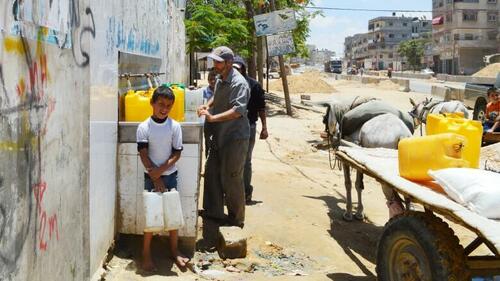
The World Health Organization (WHO) issued a dire warning for Gaza this week, saying that if the humanitarian aid situation is not immediately improved, more Palestinians could die of disease than Israeli's bombing campaign.
"Eventually we will see more people dying from disease than from bombardment if we are not able to put back together this health system," said WHO spokesperson Margaret Harris at a briefing in Geneva on Tuesday.
It's a shocking statement given the already immense death toll after seven weeks of fighting. Even the lower end estimates put the Gazan death toll at above 10,000 - while Palestinian sources this week have said it topped 15,000.

But health authorities are sounding the alarm after all hospitals across the northern half of the Gaza Strip, which faced unrelenting aerial bombardment and a ground invasion prior to the temporary truce which took effect last Friday, have ceased functioning.
Not only have fuel and supplies long ceased to north Gaza, but the sanitation system has collapsed and there has been no drinking water.
According to Al Jazeera, summarizing the WHO spokesperson's briefing:
She described the collapse of al-Shifa Hospital in northern Gaza as a “tragedy” and voiced concern about the detention of some of its medical staff by Israeli forces who took over the complex earlier this month.
She also repeated concerns about a rise in outbreaks of infectious diseases in Gaza, particularly diarrhoeal diseases.
Citing a United Nations report on the living conditions of displaced residents in northern Gaza, she said: “[There are] no medicines, no vaccination activities, no access to safe water and hygiene and no food.”
Cholera outbreaks are a growing fear, after thus far the WHO has documented 44,000 cases of diarrhoea and 70,000 acute respiratory infections.
A UN official who represents a children's relief department said there's been a rise gastroenteritis from drinking dirty water in Gazan neighborhoods. "They don’t have access to safe water and it’s crippling them," the official said.
Hundreds of people are being forced to share a single toilet and shower as overcrowding soars in south Gaza
— i newspaper (@theipaper) November 24, 2023
Aid workers fear diseases such as cholera could break out @mollyblackall reports https://t.co/ogPMEMLGF7
Since Friday's truce took effect, hundreds of international aid trucks have been allowed entry from Egypt through the Raffah crossing. It's as yet unclear if the aid convoys will be able to continue should the ceasefire collapse, however. Currently, the CIA chief and Mossad director are in Doha, Qatar seeking to extend the ceasefire. Already there are reports of progress, and the truce is expected to endure for at least two more days.
The World Health Organization (WHO) issued a dire warning for Gaza this week, saying that if the humanitarian aid situation is not immediately improved, more Palestinians could die of disease than Israeli’s bombing campaign.
“Eventually we will see more people dying from disease than from bombardment if we are not able to put back together this health system,” said WHO spokesperson Margaret Harris at a briefing in Geneva on Tuesday.
It’s a shocking statement given the already immense death toll after seven weeks of fighting. Even the lower end estimates put the Gazan death toll at above 10,000 – while Palestinian sources this week have said it topped 15,000.

But health authorities are sounding the alarm after all hospitals across the northern half of the Gaza Strip, which faced unrelenting aerial bombardment and a ground invasion prior to the temporary truce which took effect last Friday, have ceased functioning.
Not only have fuel and supplies long ceased to north Gaza, but the sanitation system has collapsed and there has been no drinking water.
According to Al Jazeera, summarizing the WHO spokesperson’s briefing:
She described the collapse of al-Shifa Hospital in northern Gaza as a “tragedy” and voiced concern about the detention of some of its medical staff by Israeli forces who took over the complex earlier this month.
She also repeated concerns about a rise in outbreaks of infectious diseases in Gaza, particularly diarrhoeal diseases.
Citing a United Nations report on the living conditions of displaced residents in northern Gaza, she said: “[There are] no medicines, no vaccination activities, no access to safe water and hygiene and no food.”
Cholera outbreaks are a growing fear, after thus far the WHO has documented 44,000 cases of diarrhoea and 70,000 acute respiratory infections.
A UN official who represents a children’s relief department said there’s been a rise gastroenteritis from drinking dirty water in Gazan neighborhoods. “They don’t have access to safe water and it’s crippling them,” the official said.
Hundreds of people are being forced to share a single toilet and shower as overcrowding soars in south Gaza
Aid workers fear diseases such as cholera could break out @mollyblackall reports https://t.co/ogPMEMLGF7
— i newspaper (@theipaper) November 24, 2023
Since Friday’s truce took effect, hundreds of international aid trucks have been allowed entry from Egypt through the Raffah crossing. It’s as yet unclear if the aid convoys will be able to continue should the ceasefire collapse, however. Currently, the CIA chief and Mossad director are in Doha, Qatar seeking to extend the ceasefire. Already there are reports of progress, and the truce is expected to endure for at least two more days.
Loading…




